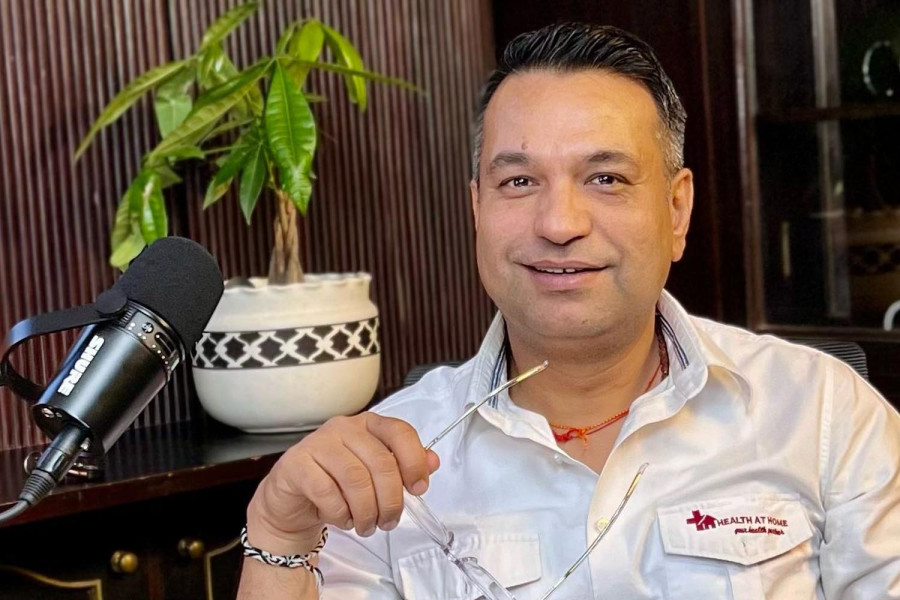
Dr. Bishal Dhakal always understood the importance, and the disparities of healthcare. Growing up in a small town in Nepal, he knew the struggles that a lack of good healthcare came with. This experience, growing up in a small town, combined with an international education, shaped his vision of a solution to affordable healthcare within Nepal. His understanding of healthcare and his experiences abroad laid the foundation for his future, innovative, company: “Health at Home,” a company that is a “one-stop shop” for all healthcare related needs in Nepal.
“I saw [more] advanced healthcare systems than what we had in Nepal, nothing [like this] existed in Nepal,” Dr. Dhakal said.
Before launching “Health at Home,” however; Dr. Dhakal started his studies in St. Petersburg, Russia, where he studied medicine. Dr. Dhakal was exposed to new forms of healthcare that didn’t exist in Nepal, saying that “ambulance services,” and “dispatch management” were not services that were around. He brought these ideas back to Nepal, trying to look for ways to innovate Nepal’s healthcare system.
“I started doing research, but there was not much [information] around this idea, but my commitment was to provide healthcare beyond hospital doors.”
His idea for a revamped healthcare system in Nepal took the services outside of hospitals and into the homes. He recognized that the traditional, hospital centric, model in Nepal was too expensive to pay out of pocket. It was also in-accessible to many communities, as some people didn’t have access to hospitals or hospital services. Dr. Dhakal envisioned healthcare where routine check-ups, preventative care, therapy, and other services could all be delivered directly to a patient’s doorstep.
“Wild idea, crazy. In Nepal, you know, nobody’s going to buy it.”
In order to make this concept a reality, Dr. Dhakal had to come up with new ideas that weren’t the norm in Nepal. He had to use his international experiences to fuel and provide inspiration to innovate: Working to make his vision of Health at Home into a reality.
As he was developing this idea of delivering healthcare to the patient, he had his first at-home patient. Nepal has many holidays where traditional services wouldn’t be open; This means that people wouldn’t be able to receive healthcare at hospitals. Health at Home, however; Allowed patients to receive care, even on holidays.
“This guy calls me up and asks, hey, listen, can you help me take care of my mom? Because, you know, there’s a celebration coming and I need to keep her [healthy].”
This led to his first patient, and his first at home visit. He sent a nurse to this patient’s house, and the nurse provided at home services. Not only was this a new service for healthcare in Nepal, it also opened up a whole new job market. Dr. Dhakal noted that nurses in hospitals in Nepal were overworked and underpaid: Causing them to leave for other countries. Health at Home was an alternative service for nurses that allowed them to get paid a livable salary and also not be overworked. According to Dr. Dhakal, it was the first time hourly pay was done in Nepal.
“I found out there was a term called temporary placements in the United States, In Nepal, I had never encountered this. I got an opportunity to do a private nursing placement duty for the first time, and to create a temporary placement job for the first time. We kept on changing the boundaries.”
Temporary placement in the United States is where an employee is temporarily put in a certain job position for a certain need. By bringing this to Nepal, he was able to provide work for nurses and other healthcare providers: Revolutionizing the local job market by offering flexible jobs with fairly paid employment opportunities. This was something that hadn’t been done in Nepal before and would not have been possible without Dr. Dhakal’s vision. By adapting concepts from other countries, he was able to use his innovation to not revolutionize only the healthcare industry, but also the job market within Nepal
Services at Health at Home include home doctor visits, nursing care, vaccinations, equipment rental, like wheelchairs, and other health services. These are all provided through in-house doctors and temporary placement jobs. Because these are done at home, it reduces the amount of money that patients would have to pay if they paid for these services at a hospital. Health at Home doesn’t have to build infrastructure at a hospital, or pay rent at a hospital, therefore cutting down on recurring costs.
None of this would have been possible without Dr. Dhakal’s innovation. He was able to create a healthcare system that prioritizes the needs of Nepal with a combination of his experience with healthcare internationally. His vision turned into a product that helps thousands of people every week in Nepal, at an affordable cost. Through this commitment, Dr. Dhakal not only transformed how healthcare was implemented in Nepal, but also set a new benchmark for accessible services.
“I would call myself a patient advocate. I fought my battle, fighting for the rights of the people, not by arguments and litigations, but by building something.”


Leave a Reply